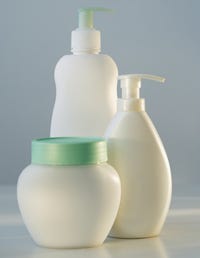NSF, NPA battle over 'natural' personal care certifications
NSF just announced its partnership with NATRUE for a new natural personal care label. The Natural Products Association claims another natural certification will only add to consumer confusion. Once existing without boundaries in the personal care aisle, will “natural” soon have one too many definitions?

Last week, NSF International, a global public health and safety organization, publicized its partnership with NATRUE, the International Natural and Organic Cosmetics Association, for the “first American national standard for natural personal care products.” But it’s not the first natural personal care certification, the Natural Products Association (NPA) quickly pointed out: It’s the first natural standard accredited the American National Standards Institute. Confusing? Depends who you ask.
NATRUE, the International Natural and Organic Cosmetics Association, for the “first American national standard for natural personal care products.” But it’s not the first natural personal care certification, the Natural Products Association (NPA) quickly pointed out: It’s the first natural standard accredited the American National Standards Institute. Confusing? Depends who you ask.
Start with the NPA, which has a vested interest in NSF's new label: In 2008, the NPA launched its natural personal care certification—the Natural Standard for Personal Care—and in early 2010 was the one working with NATRUE on an international equivalency agreement for natural personal care (a collaboration that ended abruptly for unspecified reasons, according to the NPA). Now, the Washington, D.C.-based nonprofit argues that another natural label, which retailers and consumers can expect to see on store shelves in 18 to 24 months, in the personal care market will only add to industry uncertainty. “They’re not clarifying for the consumer, they’re confusing the consumer,” says Cara Welch, PhD, NPA’s director of scientific and regulatory affairs. “For a long time, the USDA took care of the organic category, NSF had the “made with organic” category with NSF/ANSI 305, and the NPA Natural Seal addressed natural. Each had its own category and didn’t get in the other’s area.”
Why another certification?
For NSF, the label makes sense on many levels. Teaming up with NATRUE means getting one step closer to an internationally recognized definition of natural for personal care. “There is currently no regulatory, nor a globally recognized, definition for the term ‘natural.’ The new NSF/NATRUE standard will define the use of the term ‘natural,’ helping to promote authentic and quality natural personal care products,” says NSF International Standards Director Jane Wilson. And it means starting with a strong foundation from NATRUE’s pre existing European natural personal care criteria (NATRUE Standard Level 1) and consumer recognition resulting from the NSF/ANSI 305 “made with organic” certification launched last year. Plus, Wilson says it will streamline the certification process, particularly for companies offering both organic and natural products. “These manufacturers will be able to go to one certifier for their certification needs.”
Which should be the standard standard?
NPA’s Natural Standard requires 95 percent of the ingredients be natural and all ingredients in the NPA-certified products to be “generally recognized as safe” by the FDA, renewable, and found in nature. Plus, at least 60 percent of a company’s personal care product line must be natural, even if it is seeking certification for just one product. The NPA announced that the seal now appears on more than 500 products and ingredients from 45 different companies. Over the past six months, the NPA has made the regulations stricter by prohibiting synthetic fragrance, says Welsch, who speculates that this could be one reason that NSF is bringing another certification to the market. This year also marks the first year some companies that obtained the NPA label early on will have to apply for recertification.
How NSF’s standard will shape up is unknown, but it will address many of the same issues as NSF/ANSI 305 “with respect to defining minimum content requirements, allowed processes and inputs, and labeling and marketing requirements,” says Wilson. Over the next 18 to 24 months, stakeholder groups—including manufacturers, regulators, trade associations, and retailers—will develop the new natural personal care standard based on the NATRUE Standard Level 1, which is why some products may not have too far to go, according to Wilson. “Because the NATRUE criteria is already in use in Europe, and there are currently products certified to the natural label of its criteria, it appears some products will already meet this new standard.”
Consumers and retailers: caught in the middle?
Both organizations will have to step up the education process to give consumers clarity, and retailers will also need to be proactive, says Farah Ahmed, Personal Care Products Council vice president and associate counsel. “It’s really a matter of the NPA and NSF communicating what these certifications mean in an effective way to the consumer.” For NSF, this translates to working with consumer groups, says Wilson, while the NPA focuses on encouraging certified manufacturers to educate consumers. If the certifications each have a high level of transparency, these dueling labels could even benefit the personal care market, adds Ahmed. “NSF and NPA are demonstrating that there’s more than one way to substantiate these natural claims. There’s not one right way, and this allows personal care companies to continue to innovate and still make high-performance products in the natural space.”
When it comes to label recognition, neither party has an advantage, according to New Hope Natural Media’s recent Personal Care Report, which surveyed more than 600 natural products consumers. When looking for labels, “dark green” consumers are still likely to seek out the USDA Organic seal only, while “light green” consumers will trust multiple labels in the personal care aisle—and are equally familiar with NSF and NPA.
About the Author
You May Also Like





